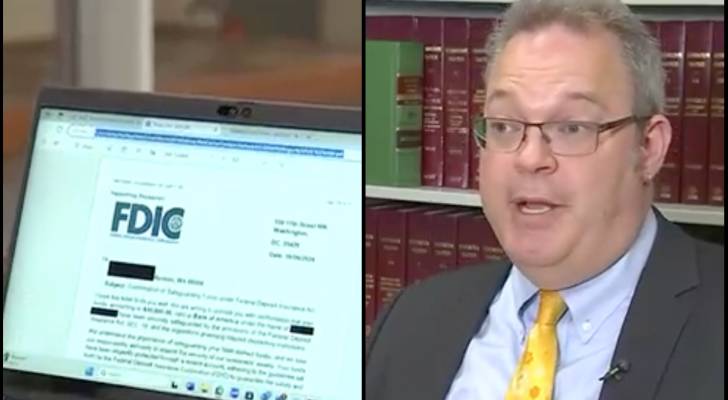We adhere to strict standards of editorial integrity to help you make decisions with confidence. Some or all links contained within this article are paid links.
If you will, allow us to present the hypothetical case of Pete Moneywise, a married, 78-year-old father of three who wants to get his financial affairs in order before his passing.
Though he exists only in the confines of this article, his situation reflects what countless retirement-age people face as they draw up their wills and create their trusts.
“I hate probate,” Pete tells us in an exclusive interview (what else did you expect? We created him). “I went through it when my father died, and my family spent the next year talking to lawyers, trying to get things squared away.”
He shares how the probate process caused tension between his siblings. He also harbored frustration over one unanswerable question: “Why didn’t Dad create a living trust? It would’ve made things so much simpler.”
Credit Pete for following his own advice. He has set up a living trust. Now, he must decide what, if anything, to leave out of it. He has done the homework for you: Here are five things to consider as you structure your living trust.
Probate explained: Best not go there
Many folks don’t even know what the word “probate” means until they’re in the thick of it.
Sometimes, not always, when a person dies — even if they left a will — a legal process is required to validate the will, name an executor to administer the estate if there isn’t one already, pay off liabilities, and then distribute the remaining assets.
The process can sometimes take years, not to mention the piles of paperwork and legal fees. For example, when the beloved entertainer Prince passed away in 2016, the legal dogfight over his estate continued in probate until August 2022.
If you are “of sound mind and body,” then you can make a will — and it’s a good idea to do that, so you don’t leave your friends and family scrambling and trying to guess at your wishes. With Trust & Will, an online service that makes it easy to create, store, edit and share your will, you can make the process as painless as possible.
Trust & Will is an organization seeking to flip that narrative, by providing helpful, concise, and human support for creating wills and estate plans. They want to make estate planning simple, accessible, and affordable for all Americans, meaning you can make sure your loved ones know, understand and have input on exactly what your plan is, before you pass.
If you want an extra layer of security and peace of mind, you can create a revocable living trust. A trust would have helped Pete’s family avoid probate, protect their privacy, and minimize estate taxes when his father died. A trust is a document that allows you to keep control of your money and property and designate who receives it once you die.
“Revocable” means you can change the terms at any time while you are alive. As the assets aren’t considered a part of your estate, they sidestep the probate process.
It also lets you continue to use assets transferred into the trust, such as property or investments you own.
If you have a large estate with plenty of investments, you may want to consider both consolidating your asset management on a single platform, and using that platform to manage the distribution of your wealth after your passing.
Arta Finance is a digital wealth management service where users can access exclusive financial strategies for the public market and alternative investments to diversify their portfolios.
In partnership with Camelot Trust, Arta Finance also offers guidance on estate planning to help safeguard estates and ensure assets are managed appropriately.
However, the advantages of trusts have their limits and certain items will only create headaches if held there.
Five items to leave out of a revocable living trust
Vehicles. Whether it’s a 1963 Corvette, a Harley chopper or a prop plane, all that’s required to pass it on is a simple written instruction to transfer the title to a beneficiary. If it’s held in a trust, you could be vulnerable to lawsuits over accidents involving the vehicle.
Annuities and retirement accounts. A trust can turn non-taxed accounts into taxable ones. However, you can make the trust itself the beneficiary, so that these accounts pass directly to your trustees without an IRS agent crashing the wake.
One way to ensure the money in your retirement accounts grows at a stable rate and gives your beneficiaries as much as they deserve is to invest in a gold IRA with the help of American Hartford Gold – a precious metals dealer offering support for opening IRAs and direct purchases of precious metals and coins.
Gold has historically acted as a hedge against inflation, and many find it to be a more secure place to invest your retirement fund.
Life insurance. No need to put this in a revocable trust. Simply name your beneficiaries within the policy. Or, create an irrevocable life insurance trust (ILIT) to avoid estate taxes.
If you’re worried about your loved ones having access to funds to cover your funeral expenses, or other costs and debts immediately after your passing, life insurance can offer a versatile solution to help support your family, providing coverage to potentially replace lost income or settle outstanding debts in the event of your death.
Opting for term life insurance through a provider like Ethos, ensures that as you age, your loved ones are protected from unexpected costs. With term life insurance, you can secure affordable coverage while managing your other financial responsibilities.
Ethos offers an easy online process that allows you to get up to $2 million in coverage with terms spanning from 10 to 30 years. To get a free quote, simply answer a few questions about yourself. Then, you can compare various policies and choose one that best suits your needs.
Assets held in other countries. This gets complicated, as you may not be permitted to place international assets in a trust. To find out if it’s possible, you’ll need to consult an estate attorney licensed in the country where your international assets are located.
Checking and savings accounts. If you use these to pay monthly bills, you may run into financial complications unless you’re the trustee and granted full control of trust assets. There’s a much easier route to take: Keep these accounts out of the trust.
And if Pete were real, he’d surely remind you that the information in this article does not constitute legal advice. Talk to a trust lawyer in your state, financial adviser, or other professional before making any decisions. Pete’s imaginary kids — and your real ones — will be grateful you did.
This article provides information only and should not be construed as advice. It is provided without warranty of any kind.


